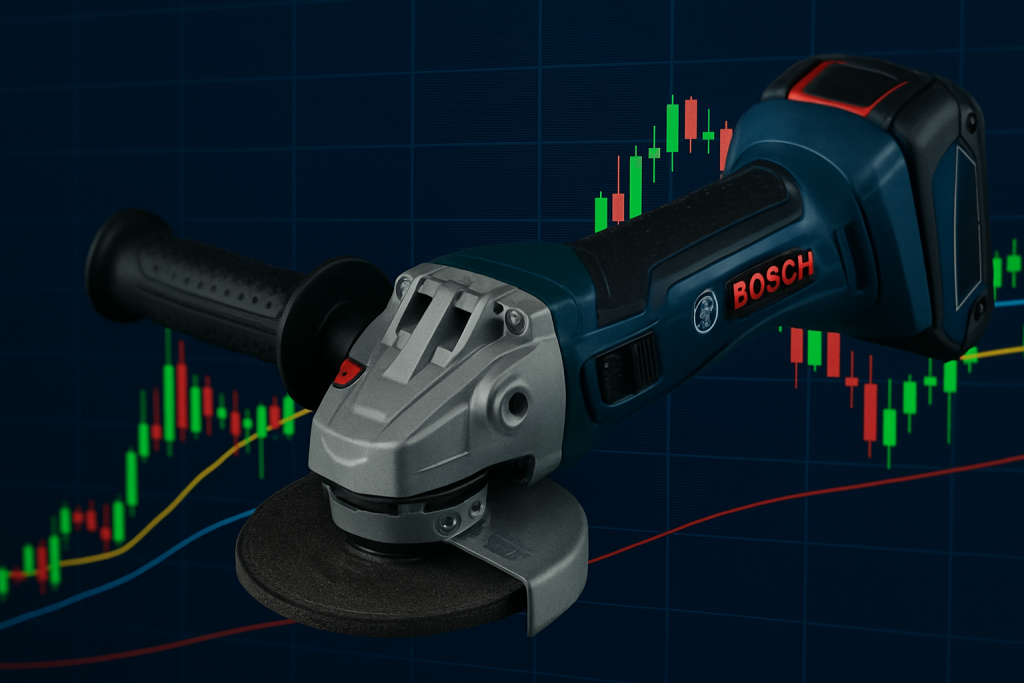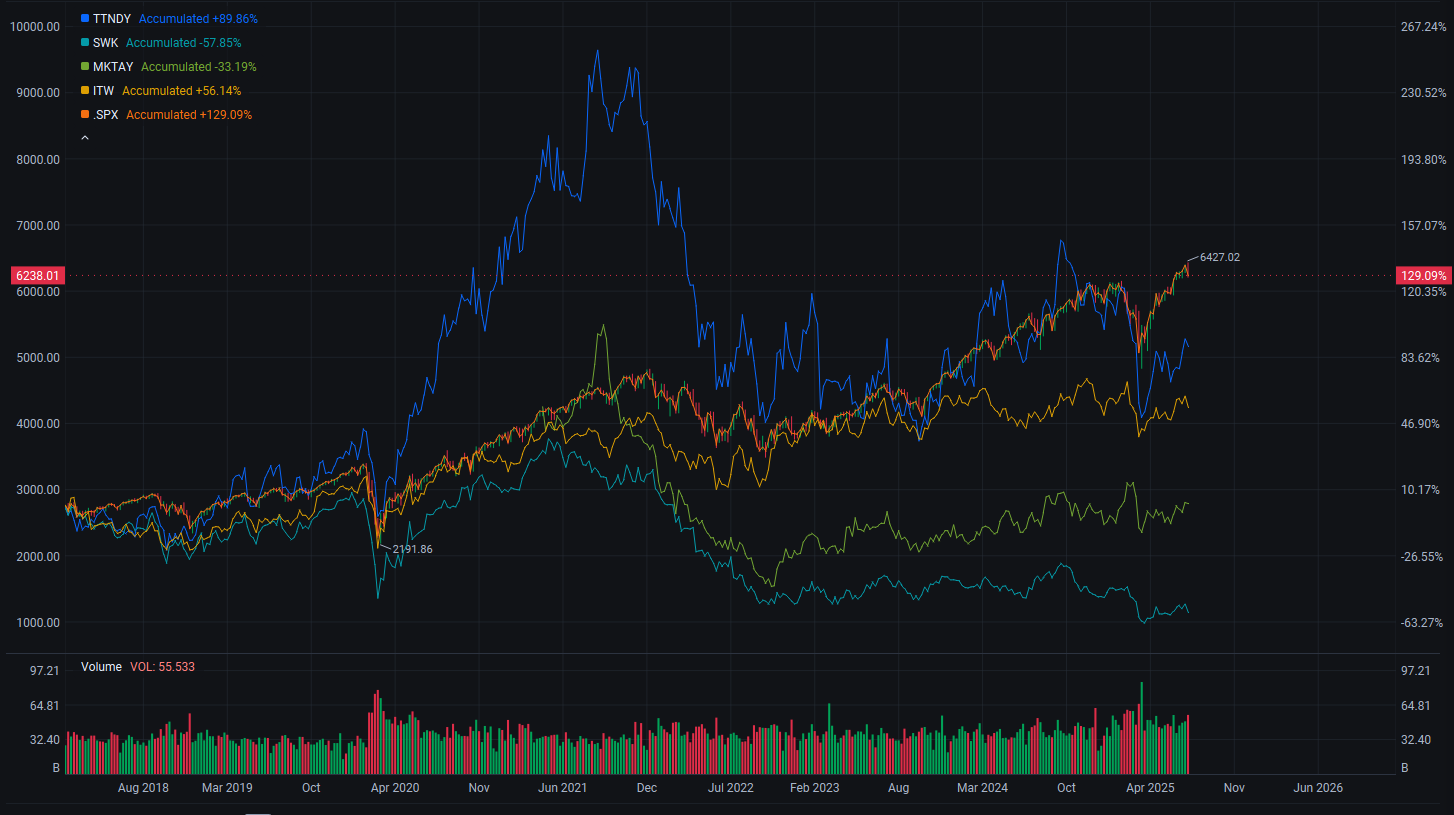Table of Contents
Intro: Tools, Stocks, and Recessions
If you’ve ever wondered how the tool industry holds up when the economy takes a hit, you’re not alone. I’ve followed the stock market for years (it was even part of my job in a past life), and I still track it closely. So naturally, I started asking: Are tool companies recession-proof, or are they just riding a boom that’s bound to break?
This article isn’t investment advice, it’s just food for thought: a look at how publicly traded tool companies behave when the pressure's on. We’ll keep it short, look at some real data, and compare tool stocks to the broader market. Because whether you’re in the trades or just like following business trends, understanding the financial side of tools gives you a smarter view of the brands you trust on the jobsite.
The Big Players: Publicly Traded Tool Companies
When we talk about "tool stocks," we’re really talking about a handful of major players, many of them behind multiple brands you see every day. Here's a quick look at the biggest publicly traded companies in the tool space:
Stanley Black & Decker (Ticker: SWK)
- Brands: DeWALT, Craftsman, Stanley, Bostitch, Porter-Cable
- Headquarters: USA
- Notes: One of the most recognized U.S.-based tool companies. Manufactures globally, with some U.S. assembly. A long-time dividend payer.
Techtronic Industries (Ticker: TTNDY)
- Brands: Milwaukee, RIDGID (licensed), Ryobi, Hoover
- Headquarters: Hong Kong
- Notes: Fast-growing, battery-platform-driven company. Dominant in the pro and DIY cordless tool space. Listed on the Hong Kong Exchange, with ADR.
Bosch (Privately Held)
- Brands: Bosch Power Tools, Dremel
- Notes: Huge player but not publicly traded, so not included in direct stock analysis.
Makita Corp (Ticker: MKTAY / 6586.T)
- Headquarters: Japan
- Notes: Known for quality and global manufacturing. Trades as an ADR on U.S. markets. Some exposure to currency risk.
Illinois Tool Works (Ticker: ITW)
- Brands: Paslode, industrial fastening tools
- Headquarters: USA
- Notes: More diversified than pure-play tool companies, but still heavily exposed to industrial and construction sectors.
These are the big names you’ll see in any tool-focused investment discussion. The next section looks at how they’ve held up during past downturns because that's where things get interesting.
Tool Stocks vs. S&P 500

Let’s look at real performance. From February 19, 2018 to August 1, 2025, we’ve seen two major downturns - the COVID crash in 2020 and the more recent global tariffs.
Here’s how the major tool-related stocks stacked up during that time:
Stocks | % Gain/Loss (Feb 2018 – Aug 2025) |
|---|---|
S&P 500 | +129% |
TTNDY (Techtronic Industries) | +89% |
ITW (Illinois Tool Works) | +56% |
MKTAY (Makita) | –33% |
SWK (Stanley Black & Decker) | –57% |
What the Numbers Tell Us:
- TTNDY had a massive run-up during COVID on the back of battery platform expansion, DIY booms, and heavy global demand. But post-2021, it’s cooled off significantly, still outperforming the other tool names, but now lagging the broader S&P.
- ITW held steady, with slower growth but consistent performance. Its diversified business across trades, fasteners, and commercial industries helped maintain stability even during downturns.
- Makita and SWK? Down over 30%. These brands have fallen behind not just in stock value but also in visibility.
From my side of the industry, here’s what I see:
TTNDY markets very aggressively. They work with influencers, push on social, stay present on YouTube, and constantly release new product lines under Milwaukee, Ryobi, and RIDGID.
ITW doesn't do flashy marketing, but they’re in the trades consistently. Their stuff gets used daily.
But Makita and SWK? They've gone almost silent. I’m in the tool business, and I rarely see them online. No big launches. No aggressive advertising. No social media traction. If I’m not seeing them, most buyers aren’t either. And that absence eventually shows up on the balance sheet.
Of course, marketing isn’t the only factor, supply chain, global politics, and R&D all matter too. But you can’t sell tools people don’t know exist. Visibility drives volume, especially in a competitive market.

What Drives Tool Stock Performance?
Tool company stocks may seem straightforward but under the hood, there’s a lot going on. These aren’t tech companies or meme stocks, they’re cyclical industrials, and that means they rise and fall with construction, consumer confidence, housing, and global trade.
Here are the major factors that move tool stocks:
Construction & Housing Activity
Tool demand is heavily tied to new construction, remodeling, and infrastructure projects. When building slows down, tool sales often follow.
Consumer vs. Pro Market Mix
Companies that rely heavily on DIY customers (like Ryobi or Craftsman) tend to be more sensitive to economic downturns. Brands selling to pros or industrial markets (like Milwaukee or Paslode) tend to be more stable.
Global Supply Chains & Tariffs
Where the tools are made and what it costs to get them there, can swing margins wildly. Tool companies with deep exposure to China, Vietnam, or global freight can see earnings get hit by tariffs, shipping costs, or political instability.
Inventory & Retail Relationships
Home Depot, Lowe’s, Amazon - these retailers control a lot of tool shelf space. When they over-order or slash forecasts, it can ripple through tool manufacturers and show up fast in stock prices.
Marketing & Brand Visibility
This one’s underrated. A company like TTNDY stays in front of customers 24/7, on social, through influencers, and with product launches. Compare that to a company like SWK, which has fallen behind in public engagement. Marketing doesn’t guarantee stock growth, but it definitely drives sales momentum.
In short, tool stocks behave more like industrials than consumer tech. They're sensitive to economic cycles, but strong brands with smart positioning and visibility can still outperform when times get tough.
Risks: What Could Go Wrong

Tool stocks might feel like a safe bet, they make real products used by real people. But that doesn’t make them bulletproof. In fact, they carry some serious risks, especially in today's global economy.
- Cyclical Exposure - Tool companies live and die by the economy. When construction slows, housing starts fall, or consumer spending tightens, tool sales drop, fast. These are not defensive stocks. They're economically sensitive and often move with broader industrial trends.
- Geopolitical and Tariff Pressure - Many tool brands manufacture in China, Vietnam, and Mexico. Any shift in tariffs, trade policy, or political tension (like U.S.–China relations) can inflate costs or disrupt supply chains overnight.
- Inventory Mismanagement - Overbuilding inventory or betting wrong on demand, especially during COVID has hurt companies like SWK. When the shelves are full and sales slow, they have to discount to move product, which kills margins and tanks earnings reports.
- Marketing Blind Spots - Outdated branding and lack of visibility can cause even strong product lines to fade from relevance. We’re seeing that right now with companies like Makita and Stanley, where lack of marketing is showing up in both perception and stock price.
- Labor Costs & Inflation - As wages rise and raw material prices fluctuate, companies that can’t pass those costs along to consumers get squeezed. Inflation isn’t over, it’s just shifted into different parts of the economy.
Tool stocks aren’t time bombs but they do carry real downside risk, especially if you’re expecting steady, defensive growth. Timing, leadership, and execution matter here more than many people realize.
Food for Thought (Not Investment Advice)
Let’s be clear, this isn’t a stock recommendation, and I’m not telling you to buy or sell anything. I follow the market closely and enjoy digging into this stuff, especially where it overlaps with tools and industry trends. But at the end of the day, this is just food for thought.
What I’m seeing is this:
- Marketing matters - The companies that stay in front of customers, through content, influencers, and launches are outperforming in both perception and stock performance.
- Diversification helps - Brands like ITW that serve commercial, industrial, and construction markets have fared better than pure DIY names.
- Old brands can fade - If you're not actively pushing your product, someone else is. And in today’s market, visibility is almost as important as product quality.
- Stocks reflect more than tools - They reflect strategy, execution, leadership, and timing. Good tools don’t always mean good stock performance and vice versa.
If you follow the tool industry closely, watching these companies in the stock market gives you a second lens into how the industry is shifting.
FAQ
Not really. They’re part of the cyclical industrial sector, meaning they rise and fall with the economy. They’re not defensive like utilities or consumer staples.
Because fewer people build, renovate, or spend on tools when times are tight. Tool demand is directly tied to housing, construction, and retail strength.
Not in today’s market. Product quality matters but so does marketing, supply chain execution, and retail presence. If people don’t know about it, they won’t buy it.
Wrap-Up: Should You Watch These Stocks?
If you're into tools and the markets, watching these stocks makes sense. They're tied to real industries, real demand, and real economic cycles. But if you’re looking for safe, steady growth? Tool stocks haven’t delivered like the S&P 500 has, at least not over the last 7 years.
The reality is this: good tools don’t always mean good stock performance. Brand strength, innovation, marketing, and leadership all matter and so does timing. Companies like TTNDY have done well thanks to visibility and aggressive strategy. Others, like Makita and SWK, have fallen behind, not just in the market, but in public presence.
You don’t have to invest in them to pay attention. These companies are a mirror of what’s happening in the trades, in retail, and in global manufacturing. Watching how they move tells you a lot about where the industry might be headed.
Again, this isn’t investment advice. Just an honest look at how tool companies stack up in the market, and what we can learn by following the numbers.



